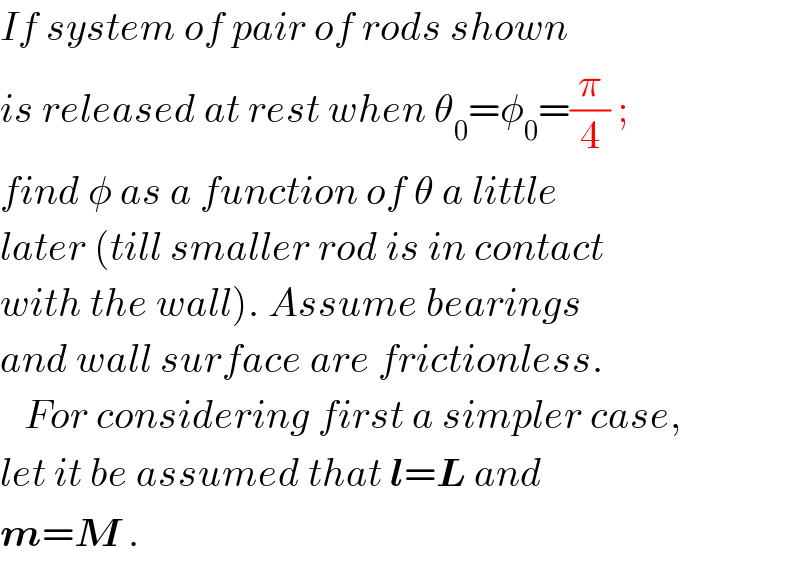
Question Number 23739 by ajfour last updated on 04/Nov/17

Commented by ajfour last updated on 04/Nov/17

$${If}\:{system}\:{of}\:{pair}\:{of}\:{rods}\:{shown} \\ $$$${is}\:{released}\:{at}\:{rest}\:{when}\:\theta_{\mathrm{0}} =\phi_{\mathrm{0}} =\frac{\pi}{\mathrm{4}}\:; \\ $$$${find}\:\phi\:{as}\:{a}\:{function}\:{of}\:\theta\:{a}\:{little} \\ $$$${later}\:\left({till}\:{smaller}\:{rod}\:{is}\:{in}\:{contact}\right. \\ $$$$\left.{with}\:{the}\:{wall}\right).\:{Assume}\:{bearings} \\ $$$${and}\:{wall}\:{surface}\:{are}\:{frictionless}. \\ $$$$\:\:\:{For}\:{considering}\:{first}\:{a}\:{simpler}\:{case}, \\ $$$${let}\:{it}\:{be}\:{assumed}\:{that}\:\boldsymbol{{l}}=\boldsymbol{{L}}\:{and} \\ $$$$\boldsymbol{{m}}=\boldsymbol{{M}}\:. \\ $$
Commented by mrW1 last updated on 04/Nov/17
![Lcos θ+lcos φ=(L+l)cos θ_0 =constant ⇒φ=cos^(−1) [((L/l)+1)cos θ_0 −((L/l))cos θ]](Q23742.png)
$$\mathrm{Lcos}\:\theta+\mathrm{lcos}\:\phi=\left(\mathrm{L}+\mathrm{l}\right)\mathrm{cos}\:\theta_{\mathrm{0}} =\mathrm{constant} \\ $$$$\Rightarrow\phi=\mathrm{cos}^{−\mathrm{1}} \left[\left(\frac{\mathrm{L}}{\mathrm{l}}+\mathrm{1}\right)\mathrm{cos}\:\theta_{\mathrm{0}} −\left(\frac{\mathrm{L}}{\mathrm{l}}\right)\mathrm{cos}\:\theta\right] \\ $$
Commented by ajfour last updated on 05/Nov/17

$${thank}\:{you}\:{sir}. \\ $$
